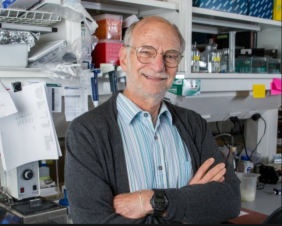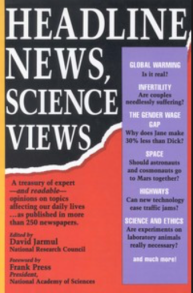Back when I was a science writer in the Washington, D.C. area, I interacted with three of the scientists who received Nobel Prizes this past week, a fact that’s reminded me of the career I left behind and led me to reflect on what I’m doing now.

I worked on an op-ed article with Richard Thaler, who won this year’s economics prize for his pioneering work showing how people make decisions less rationally than models may predict. I later included his article, “The Economics of Reality,” in an anthology I produced for the National Academy of Sciences, which you can download for free. I loved working with Thaler, who was brilliant and fun. (You may have seen his cameo with Selena Gomez in “The Big Short.”) He’s definitely having a better year than Bill Cosby, whose article began the anthology.

Joachim Frank was among this year’s three chemistry winners. I visited with him in his lab when he was at the Wadsworth Center in Albany. His innovations with cryo-electron microscopy helped transform how scientists visualize biological molecules. Both he and Michael Rosbash, who shared this year’s prize in physiology or medicine, were investigators of the Howard Hughes Medical Institute (HHMI), where I worked in the communications office.

Rosbash’s research helped change how we think about sleep and “circadian rhythms,” a subject he discussed eloquently in a televised lecture series on which I worked.
I used to pay close attention to “Nobel season” every October when I was at HHMI, whose researchers seemed to get the call from Stockholm every other year or so for the medicine or chemistry prize. I was sometimes awoken by reporters seeking to interview the winner. I remember being called one year by a reporter friend at NPR. “Who won?” I asked him, half-asleep. “Günter Blobel,” he responded, citing a scientist who showed how proteins move within cells. If I remember correctly, one of my colleagues, who took the lead on these requests, was able to connect them quickly.
 I left Washington to run the news and communications office at Duke. A decade later, the university claimed its first Nobelist, ironically someone also affiliated with HHMI. In fact, I’d commissioned and edited a major profile of Bob Lefkowitz for HHMI’s magazine. He shared the 2012 chemistry prize for his discoveries about how biological signals pass into and through cells. After we were alerted early in the morning to his happy news, our Duke team pulled together a press conference and media package within a few hours. As usual, Bob was moving, funny and inspiring as he spoke with reporters.
I left Washington to run the news and communications office at Duke. A decade later, the university claimed its first Nobelist, ironically someone also affiliated with HHMI. In fact, I’d commissioned and edited a major profile of Bob Lefkowitz for HHMI’s magazine. He shared the 2012 chemistry prize for his discoveries about how biological signals pass into and through cells. After we were alerted early in the morning to his happy news, our Duke team pulled together a press conference and media package within a few hours. As usual, Bob was moving, funny and inspiring as he spoke with reporters.
Some of those reporters were star-struck, even more than when they met Coach K for the first time. They didn’t know what I had learned over the years, which is that Nobel Prize winners and other eminent scientists are pretty much like the rest of us, just really smart.

I was reminded at such moments of how lucky I was to work with people whose groundbreaking research was saving lives and transforming human knowledge.
This week, as I’ve been cheering for Rosbash, Frank and Thaler, I’ve also reflected on how memories like these evolve with our own lives. When I worked with each of them — briefly, to be sure — it was just an ordinary part of my job. Now I savor those moments.
In the same way, things that now appear routine to me as a second-year Peace Corps Volunteer in Moldova will probably seem different in the future. A decade or two from now, I may look back and think: “Wow, did Champa and I really do that when we were in our 60s?” Perhaps the same thing has happened to you, too: The ordinary becomes extraordinary without actually changing, a quantum motion of the heart. No one has won a Nobel Prize yet for explaining why this happens. Maybe next October.



Maybe next October… 🙂
LikeLiked by 1 person